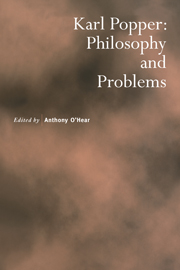Book contents
- Frontmatter
- Contents
- Introduction
- Popper, Science and Rationality
- Popper and Reliabilism
- The Problem of the Empirical Basis
- ‘Revolution in Permanence’: Popper on Theory-Change in Science
- Popper's Contribution to the Philosophy of Probability
- Propensities and Indeterminism
- Popper on Determinism
- Popper and the Quantum Theory
- The Uses of Karl Popper
- Popper and Darwinism
- Popper and the Scepticism of Evolutionary Epistemology, or, What Were Human Beings Made For?
- Does Popper Explain Historical Explanation?
- The Grounds for Anti-Historicism
- What Use is Popper to a Politician?
- Ethical Foundations of Popper's Philosophy
- Works of Karl Popper Referred to in the Text
- Notes on Contributors
- Index
Popper on Determinism
Published online by Cambridge University Press: 19 January 2010
- Frontmatter
- Contents
- Introduction
- Popper, Science and Rationality
- Popper and Reliabilism
- The Problem of the Empirical Basis
- ‘Revolution in Permanence’: Popper on Theory-Change in Science
- Popper's Contribution to the Philosophy of Probability
- Propensities and Indeterminism
- Popper on Determinism
- Popper and the Quantum Theory
- The Uses of Karl Popper
- Popper and Darwinism
- Popper and the Scepticism of Evolutionary Epistemology, or, What Were Human Beings Made For?
- Does Popper Explain Historical Explanation?
- The Grounds for Anti-Historicism
- What Use is Popper to a Politician?
- Ethical Foundations of Popper's Philosophy
- Works of Karl Popper Referred to in the Text
- Notes on Contributors
- Index
Summary
Introduction
There is no doubt at all that the issue of determinism versus indeterminism was a central, dominating theme of Popper's thought. By his own account he saw his criticism of the thesis of determinism as crucial to his defence not only of the reality of human freedom, moral responsibility and creativity but also as equally fundamental to his account of human rationality and to his theory of the content and growth of science as an objective, rational and most importantly demonstrably rational enterprise. Consequently a great deal of his writings discussing both the content and methodology of the natural and the social sciences alternately bear upon and presuppose his defence of indeterminism.
Like many distinguished philosophers before him, he held that notions crucial to the way we ordinarily see ourselves as rational agents would be rendered completely otiose if the thesis of physical determinism were globally true. The truth of determinism he urged would entail that we inhabited a nightmare world. Commenting approvingly on the opening passage of Arthur Holly Compton's The Freedom of Man Popper wrote as follows:
Compton described here what I shall call ‘the nightmare of the physical determinist’. A deterministic physical clockwork mechanism is, above all, completely self contained: in the perfect deterministic physical world there is simply no room for any outside intervention. Everything that happens in such a world is physically predetermined, including all our movements and therefore all our actions. […]
Information
- Type
- Chapter
- Information
- Karl PopperPhilosophy and Problems, pp. 149 - 162Publisher: Cambridge University PressPrint publication year: 1996
